Related Research Articles
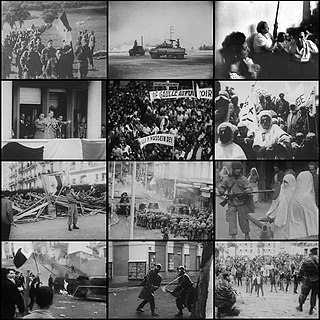
The Algerian War was a major armed conflict between France and the Algerian National Liberation Front (FLN) from 1954 to 1962, which led to Algeria winning its independence from France. An important decolonization war, it was a complex conflict characterized by guerrilla warfare and war crimes. The conflict also became a civil war between the different communities and within the communities. The war took place mainly on the territory of Algeria, with repercussions in metropolitan France.
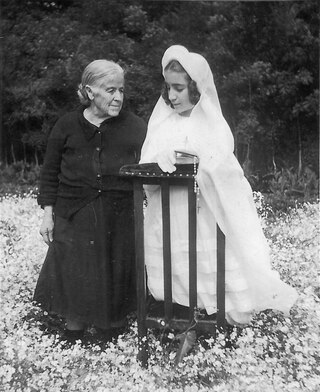
The pieds-noirs are an ethno-cultural group of people of French and other European descent who were born in Algeria during the period of French colonial rule from 1830 to 1962. Many of them departed for mainland France during and after the war by which Algeria gained its independence in 1962.

Harki is the generic term for native Muslim Algerians who served as auxiliaries alongside the French Army during the Algerian War from 1954 to 1962. The word sometimes applies to all Algerian Muslims who supported French Algeria during the war. The motives for enlisting were mixed. They were regarded as traitors in independent Algeria and thousands of them were reportedly killed after the war in reprisals, despite the Évian Accords ceasefire and amnesty stipulations. President Charles de Gaulle controversially made the decision to not give the Harkis sanctuary in France, viewing them as "soldiers of fortune" who should be discharged as soon as possible.

The Évian Accords were a set of peace treaties signed on 18 March 1962 in Évian-les-Bains, France, by France and the Provisional Government of the Algerian Republic, the government-in-exile of FLN, which sought Algeria's independence from France. The Accords ended the 1954–1962 Algerian War with a formal cease-fire proclaimed for 19 March and formalized the status of Algeria as an independent nation and the idea of cooperative exchanges between the two countries.

The Sétif and Guelma massacre was a series of attacks by French colonial authorities and pied-noir European settler militias on Algerian civilians in 1945 around the market town of Sétif, west of Constantine, in French Algeria. In response to French police firing on demonstrators at a protest on 8 May 1945, native Algerians rioted in the town. Others attacked French settlers (colons) in the surrounding countryside, resulting in 102 deaths. The French colonial authorities and European settlers retaliated by killing an estimated 6,000 to 45,000 Muslims in the region.
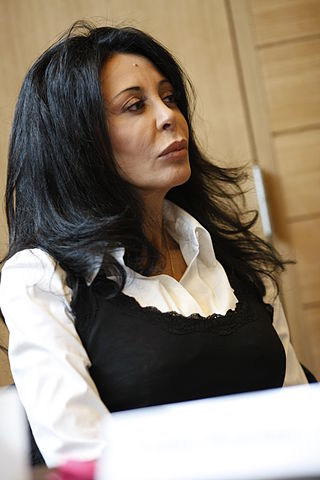
Yamina Benguigui is a French film director and politician of Algerian descent. She is known for her films on gender issues in the North African immigrant community in France. Through her films, Benguigui gave a voice to many from the Maghrebi population in France.
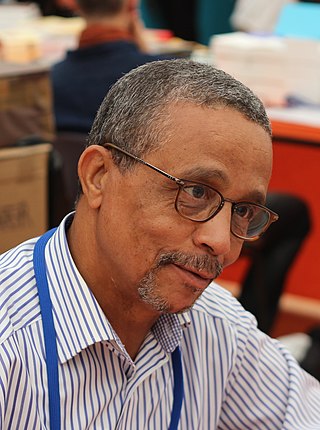
Mohammed Moulessehoul, better known by the pen name Yasmina Khadra, is an Algerian author living in France, who writes in French. One of the most famous Algerian novelists in the world, he has written almost 40 novels, and has published in more than 50 countries. Khadra has often explored Algerian and other Arab countries' civil wars, depicting Muslim conflicts and reality, the attraction of radical Islamism to those alienated by the incompetence and hypocrisy of politicians, and conflicts between East and West. In his several writings on the Algerian war, he has exposed the regime and the fundamentalist opposition as the joint guilty parties in the country's tragedy.
The Oran massacre of 1962 was the mass killing of Pied-Noir and European expatriates living in Algeria. It took place in Oran beginning on the date of Algerian independence, and ended on 7 July 1962. Estimates of the casualties vary from a low of 95 to 365 deaths in a report by a group of historians sent to the French government in 2006, and have been utilised by right-wing parties.
The 23 February 2005 French law on colonialism was an act passed by the National Assembly, which imposed on high-school (lycée) teachers a requirement to teach the "positive values" of colonialism to their students. The law, particularly the aforementioned paragraph and Articles 1 and 13, created a public uproar and drew massive opposition from the left, and Article 4, Paragraph 2 was repealed by president Jacques Chirac (UMP) at the beginning of 2006, after accusations of historical revisionism from various teachers and historians, including Pierre Vidal-Naquet, Claude Liauzu, Olivier Le Cour Grandmaison and Benjamin Stora. Its Article 13 was also criticized as it supported former Organisation armée secrète (OAS) militants.

Henri François Maillot was a pied-noir member of the Algerian Communist Party and participated in the Algerian War. In 1956, Maillot deserted from his military unit, taking with him an important stock of arms and ammunition for the guerrillas. He was killed in a battle against French forces near Orléansville two months later.
The Battle of Philippeville, also known as the Philippeville massacre or the August Offensive, was a series of raids launched on 20 August 1955 on various cities and towns of the Constantine region by FLN insurgents and armed mobs during the Algerian War between France and the Algerian rebels. The raids, which mostly took the form of ethnic riots, resulted in the massacre of several dozens of European settlers, known as pieds-Noirs. The massacres were then followed by reprisals by the French army and pied-noir vigilantes, which resulted in the death of several thousand Muslim Algerians. The events of late August 1955 in the Constantinois region are considered to be a major turning point of the Algerian War.

Fatma Besnaci, known as Fatima Besnaci-Lancou, her pen name, is a French writer known for her work on Memories of harkis in France. Harkis were Algerian auxiliaries who fought for France during Algerian War.

Jean-Noël Pancrazi is a French author.
Independence Day, observed annually on 5 July, is a National Holiday in Algeria commemorating colonial Algerian independence from France on 5 July 1962.
La Valise ou le Cercueil is a 2011 French documentary about the pieds-noirs who fled from French Algeria to mainland France after the Évian Accords at the end of the Algerian War. It was directed by Charly Cassan, who was awarded a knighthood in the Order of Academic Palms for the film.

Soldiers of the Algerian Opposition was a French-based Algerian paramilitary organization active during the 1970s.
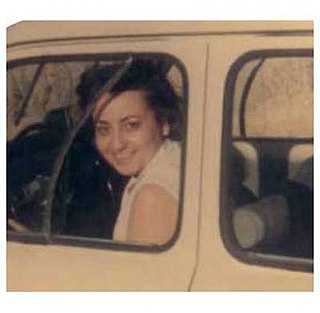
Eveline Safir Lavalette was an Algerian Pied-Noir revolutionary and activist during the Algerian War of Independence. She was born in 1927 in Rouïba. In 1951, she became active in the Algerian Youth Association for Social Action, and became an anti-poverty crusader. This began her interest in political affairs. She joined the National Liberation Front (Algeria) as an officer, distributing pamphlets and assisting with the publication of the Front's underground newspaper, El Moudjahid. She is famous for her arrest by French colonial forces in 1956, as documented in her autobiographical text Juste Algérienne: Comme une tissure. She was imprisoned and tortured until 1959, when she was released.

The 1962 Isly massacre was an incident during the Algerian War when French Army soldiers opened fire on a crowd of Pied-Noir demonstrators marching in support of France's control over Algeria on 26 March 1962. Following the army's blockade of Bab El Oued, which served as the headquarters of the Organisation armée secrète (OAS), the OAS called for massive demonstrations to force an end to the blockade. In response to the call, as well as news of the signing of the Évian Accords, which ended the Algerian War by confirming Algeria's independence, crowds of anti-independence Pied-Noirs marched throughout Algiers, denouncing the treaty.

Maboula Soumahoro is a French scholar and Afro-feminist whose parents came to France from the Ivory Coast in the late 1960s. An associate professor in the English department of the University of Tours, she specializes in studies on Afro-American diaspora and has published a paper on Rastafari. A contributor to the French committee on the history of slavery, Soumahoro launched the French version of Black History Month in 2011. In 2020, she published Le triangle et l’hexagone inspired by her own experiences as an anti-racist Black French Muslim.
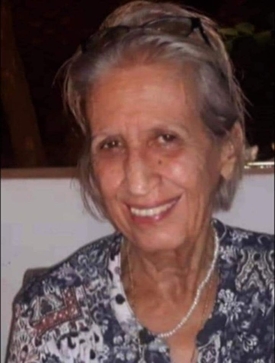
Zahia Mentouri-Chentouf was an Algerian physician and government official who served as the Algerian Minister of Health and Social Affairs in 1992.
References
- 1 2 3 "Who's a Muslim?". France-Amérique. 2021-03-02. Retrieved 2022-06-01.
- ↑ Ivey, Beatrice. "Saint-Maurice-l'Ardoise Harki Camp – Pieds-Noirs". Pied Noirs. Retrieved 2022-06-01.
- 1 2 3 4 "Zahia Rahmani". Evene.fr (in French). Retrieved 2022-06-01.
- 1 2 3 4 "Zahia Rahmani - INHA". INHA. Retrieved 2022-06-02.
- ↑ ""Muslim": A Novel by Zahia Rahmani". World Literature Today. 2019-06-14. Retrieved 2022-06-01.
- ↑ "Independent journalism cooperative Brick House has launched; Zahia Rahmani awarded the 2020 Albertine Prize". Book Forum. Retrieved 2022-06-01.
- ↑ "France, story of a childhood". French Culture.
- ↑ "Book Review: "France: Story of a Childhood" -- A Timely Memoir of Liberation". The Arts Fuse. Retrieved 2022-06-02.
- 1 2 "Zahia Rahman". NYU Gallatin.
- ↑ "Made in Algeria". Ibraaz. Retrieved 2022-06-02.
- ↑ "Seismography of Struggle". The Gallatin Galleries. 2018-09-06. Retrieved 2022-06-02.